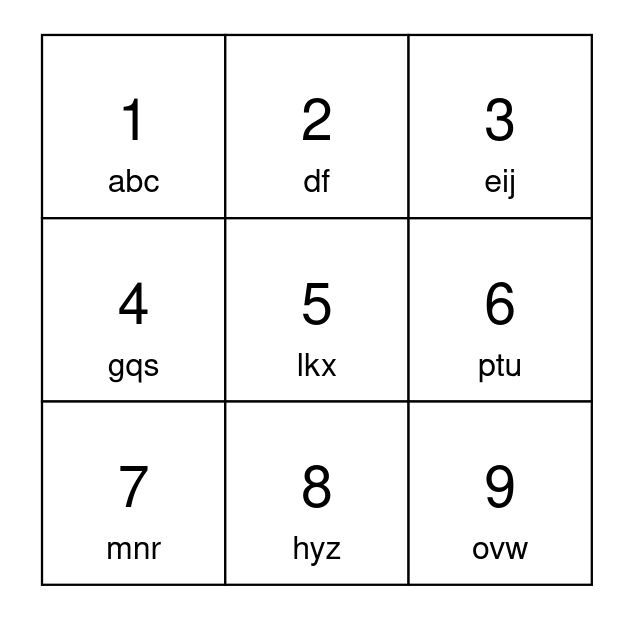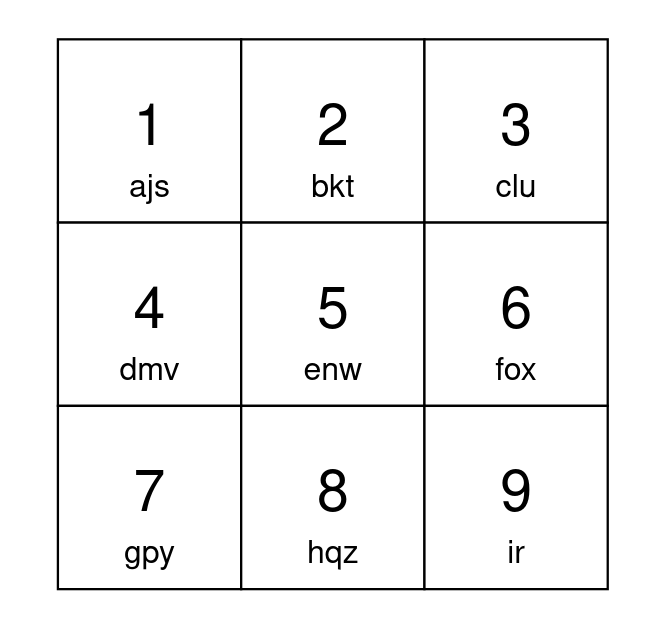2268. Minimum Number of Keypresses 🔒
Description
You have a keypad with 9 buttons, numbered from 1 to 9, each mapped to lowercase English letters. You can choose which characters each button is matched to as long as:
- All 26 lowercase English letters are mapped to.
- Each character is mapped to by exactly
1button. - Each button maps to at most
3characters.
To type the first character matched to a button, you press the button once. To type the second character, you press the button twice, and so on.
Given a string s, return the minimum number of keypresses needed to type s using your keypad.
Note that the characters mapped to by each button, and the order they are mapped in cannot be changed.
Example 1:

Input: s = "apple" Output: 5 Explanation: One optimal way to setup your keypad is shown above. Type 'a' by pressing button 1 once. Type 'p' by pressing button 6 once. Type 'p' by pressing button 6 once. Type 'l' by pressing button 5 once. Type 'e' by pressing button 3 once. A total of 5 button presses are needed, so return 5.
Example 2:

Input: s = "abcdefghijkl" Output: 15 Explanation: One optimal way to setup your keypad is shown above. The letters 'a' to 'i' can each be typed by pressing a button once. Type 'j' by pressing button 1 twice. Type 'k' by pressing button 2 twice. Type 'l' by pressing button 3 twice. A total of 15 button presses are needed, so return 15.
Constraints:
1 <= s.length <= 105sconsists of lowercase English letters.
Solutions
Solution 1: Counting + Greedy
First, we count the occurrence of each character in the string $s$, and record it in an array or hash table $\textit{cnt}$.
The problem requires minimizing the number of key presses, so the $9$ most frequent characters should correspond to keys $1$ to $9$, the $10$th to $18$th most frequent characters should correspond to keys $1$ to $9$ again, and so on.
Therefore, we can sort the values in $\textit{cnt}$ in descending order, and then allocate them to the keys in the order from $1$ to $9$, adding $1$ to the number of key presses after allocating every $9$ characters.
The time complexity is $O(n + |\Sigma| \times \log |\Sigma|)$, and the space complexity is $O(|\Sigma|)$. Here, $n$ is the length of the string $s$, and $\Sigma$ is the set of characters appearing in the string $s$. In this problem, $\Sigma$ is the set of lowercase letters, so $|\Sigma| = 26$.
Python3
class Solution:
def minimumKeypresses(self, s: str) -> int:
cnt = Counter(s)
ans, k = 0, 1
for i, x in enumerate(sorted(cnt.values(), reverse=True), 1):
ans += k * x
if i % 9 == 0:
k += 1
return ans
Java
class Solution {
public int minimumKeypresses(String s) {
int[] cnt = new int[26];
for (int i = 0; i < s.length(); ++i) {
++cnt[s.charAt(i) - 'a'];
}
Arrays.sort(cnt);
int ans = 0, k = 1;
for (int i = 1; i <= 26; ++i) {
ans += k * cnt[26 - i];
if (i % 9 == 0) {
++k;
}
}
return ans;
}
}
C++
class Solution {
public:
int minimumKeypresses(string s) {
int cnt[26]{};
for (char& c : s) {
++cnt[c - 'a'];
}
sort(begin(cnt), end(cnt), greater<int>());
int ans = 0, k = 1;
for (int i = 1; i <= 26; ++i) {
ans += k * cnt[i - 1];
if (i % 9 == 0) {
++k;
}
}
return ans;
}
};
Go
func minimumKeypresses(s string) (ans int) {
cnt := make([]int, 26)
for _, c := range s {
cnt[c-'a']++
}
sort.Ints(cnt)
k := 1
for i := 1; i <= 26; i++ {
ans += k * cnt[26-i]
if i%9 == 0 {
k++
}
}
return
}
TypeScript
function minimumKeypresses(s: string): number {
const cnt: number[] = Array(26).fill(0);
const a = 'a'.charCodeAt(0);
for (const c of s) {
++cnt[c.charCodeAt(0) - a];
}
cnt.sort((a, b) => b - a);
let [ans, k] = [0, 1];
for (let i = 1; i <= 26; ++i) {
ans += k * cnt[i - 1];
if (i % 9 === 0) {
++k;
}
}
return ans;
}